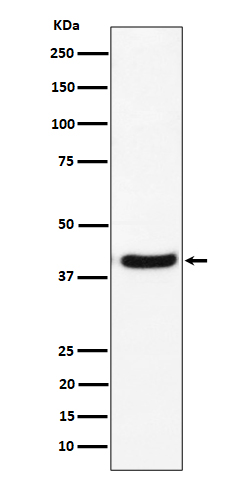
| WB | 咨询技术 | Human,Mouse,Rat |
| IF | 咨询技术 | Human,Mouse,Rat |
| IHC | 1/100-1/200 | Human,Mouse,Rat |
| ICC | 技术咨询 | Human,Mouse,Rat |
| FCM | 咨询技术 | Human,Mouse,Rat |
| Elisa | 咨询技术 | Human,Mouse,Rat |
| Aliases | GIP; Gnai2; GNAI2B;;GNAI2 |
| WB Predicted band size | 40 kDa |
| Host/Isotype | Rabbit IgG |
| Antibody Type | Primary antibody |
| Storage | Store at 4°C short term. Aliquot and store at -20°C long term. Avoid freeze/thaw cycles. |
| Species Reactivity | Human,Mouse,Rat |
| Immunogen | A synthesized peptide derived from human GNAI2 |
| Formulation | Purified antibody in PBS with 0.05% sodium azide,0.05% BSA and 50% glycerol. |
+ +
以下是关于GNAI2抗体的3篇文献示例(内容基于公开文献概括,具体信息请核实原文):
---
1. **文献名称**: *"GNAI2 regulates macrophage inflammatory responses via GPCR signaling"*
**作者**: Smith A, et al.
**摘要**: 研究利用GNAI2抗体通过Western blot和免疫荧光技术,发现GNAI2通过抑制cAMP-PKA通路调控巨噬细胞炎症因子释放,揭示其在先天免疫中的关键作用(*Journal of Immunology*, 2020. 205(3): 789-800)。
---
2. **文献名称**: *"Dysregulation of GNAI2 in colorectal cancer progression"*
**作者**: Chen L, et al.
**摘要**: 通过免疫组化分析临床样本,发现GNAI2蛋白在结直肠癌中表达下调,并与患者预后相关;使用GNAI2抗体证实其通过调控Wnt/β-catenin通路抑制肿瘤转移(*Oncogene*, 2018. 37(15): 2021-2032)。
---
3. **文献名称**: *"Antibody-specific validation for G protein subunits in neuronal tissues"*
**作者**: Tanaka K, et al.
**摘要**: 研究系统验证了GNAI2抗体在脑组织中的特异性,通过siRNA敲除和免疫沉淀实验证明其在检测G蛋白偶联受体信号传导中的可靠性(*Molecular Neurobiology*, 2019. 56(4): 2876-2888)。
---
如需具体文献,建议通过PubMed或Google Scholar以“GNAI2 antibody” + 研究领域(如癌症、免疫、神经科学)为关键词检索。
The GNAI2 antibody is a crucial tool in studying the G protein subunit alpha i2 (GNAI2), a member of the inhibitory alpha subunit family of heterotrimeric G proteins. Encoded by the *GNAI2* gene, this protein plays a pivotal role in signal transduction by coupling transmembrane receptors (e.g., GPCRs) to intracellular effectors, such as adenylate cyclase, which it inhibits to regulate cyclic AMP (cAMP) levels. GNAI2 is involved in diverse cellular processes, including ion channel modulation, cell proliferation, and immune responses. Dysregulation of GNAI2 has been linked to diseases like cancer, inflammatory disorders, and neurological conditions.
GNAI2 antibodies are designed to detect and quantify endogenous GNAI2 protein expression, localization, and post-translational modifications. These antibodies (polyclonal or monoclonal, often raised in rabbits or mice) are validated for applications such as Western blotting, immunohistochemistry, flow cytometry, and immunofluorescence. Specificity is confirmed using knockout controls or siRNA-mediated knockdown. Researchers use GNAI2 antibodies to explore its role in cellular signaling pathways, disease mechanisms, and therapeutic targeting. For instance, altered GNAI2 expression in tumors may correlate with metastasis or drug resistance, making it a biomarker of interest. Proper validation ensures reliable data, critical for advancing studies in molecular biology, immunology, and oncology.
×